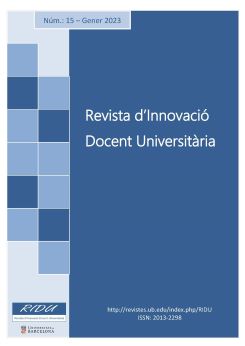Analysis of socioeducational reports as a professionalizing learning experience in the degree of Social Education
DOI:
https://doi.org/10.1344/RIDU2023.15.2Keywords:
Social Education, Socio-educational report, Professional exercise, Professionalizing activityAbstract
An academic activity is presented in a subject of the Degree of Social Education which is based on the analysis of socio-educational reports (SER) carried out during the 2020-2021 academic year. The main objective is to promote professional skills in Social Education according to the current curriculum of offering competent academic training oriented towards professional practice. This activity serves to respond to the lack of professionalizing experiences related to the exercise of writing and analyzing SERs. The article begins with an up-to-date theoretical and conceptual review of the concept and importance of the socio-educational report and its implications at a professional level, to then set out the planning of the experience (context, target persons, the description of the own teaching experience in terms of objectives, phases of development, teaching resources and assessment). Based on various reflections collected from the activity by the students, this is positively evaluated as it has allowed to acquire a professional vision of the SER, based on the analysis of linguistic and writing aspects, structure and of organization, as well as ethics related to the treatment of personal data, and critical theoretical reflection on the implications of working with social reports.
References
Amador, L. V., Esteban, M., Cárdenas, M. R., i Terrón, M. T. (2014). Ámbitos de profesionalización del educador/a social: perspectivas y complejidad. Revista de Humanidades, 21, 51-70. https://doi.org/10.5944/rdh.21.2014.13928
Benítez Ramírez, M. del C. (2013). El informe socioeducativo: instrumento de la Educación Social. Revista de Educación Social. 16. 1-17. https://www.eduso.net/res/pdf/16/info_res_%2016.pdf
Colom Masfret, D. (2005). Libro Verde de Trabajo Social: instrumentos de documentación técnica. Consejo General de Colegios Oficiales de Diplomados en Trabajo Social y Asistentes Sociales.
Direcció Tècnica d’Acció Social (2010). L’acció socioeducativa en el marc dels Serveis Socials Bàsics de l’Ajuntament de Barcelona. https://ajuntament.barcelona.cat/dretssocials/sites/default/files/arxius-documents/accio-socioeducativa-serveis-socials-basics.pdf
Eyler, J., i Giles, D. E. (1999). Where’s the Learning in Service-Learning? Jossey-Bass.
Eslava, M. D., de León, C., i González, I. (2020). La professió de l’educació social a Espanya: Una mirada universitària. Educació social. Revista d’intervenció socioeducativa, 76, 109-128. https://doi.org/10.34810/EducacioSocialn76id372875
Freixa-Niella, M., Torrado-Fonseca, M., Dorio-Alcaraz, I., i Pelfort-Homs, E. (2012). Les diplomades i els diplomats en Educació Social a la Universitat de Barcelona: més d’una dècada de trajectòria en el mercat laboral. REIRE, Revista d’Innovació i Recerca en Educació, 5(1), 13-36. https://doi.org/10.1344/reire2012.5.1512
Fuentes, N. (2004). Proyecto académico. Documento policopiado. Universitat de Barcelona.
Fuertes-Alpiste, M., i Mundet Bolós, A. (2021a). (22 d’abril, 2021). Aspectes de la comunicació en els informes de l’àmbit socioeducatiu. OMADO (Objectes i MAterials DOcents). http://hdl.handle.net/2445/176559
Fuertes-Alpiste, M., i Mundet Bolós, A. (2021b). (22 d’abril, 2021). Rúbrica d'avaluació: Activitat d'anàlisi i de disseny d'un Pla de Comunicació. OMADO (Objectes i MAterials DOcents). http://hdl.handle.net/2445/152906
Gómez Serra, M., Escofet Roig, A., i Freixa Niella, M. (2014). Los equipos docentes en la educación superior ¿Utopía o realidad? Revista española de pedagogía, 259, 509-523.
McDonald, D., Boddy, J., O’Callaghan, K., i Chester, P. (2015). Ethical Professional Writing in Social Work and Human Services, Ethics and Social Welfare, 9(4), 359-374. https://doi.org/10.1080/17496535.2015.1009481
Mundet Bolós, A., i Fuertes-Alpiste, M. (22 d’abril, 2021). L’informe social: la construcció i l’anàlisi des de la pràctica professional. Activitat: seminari/taller teòric-pràctic. OMADO (Objectes i MAterials DOcents). http://hdl.handle.net/2445/176504
Pérez Rivero, L. (2000). La documentación específica en trabajo social: la historia, la ficha y el informe social. Cuadernos de Trabajo Social, 13, 75-90. https://revistas.ucm.es/index.php/CUTS/article/view/CUTS0000110075A
Puig, J. M., Batlle, R., Bosch, C., i Palos, J. (2007). Aprendizaje servicio. Educar para la ciudadanía. Octaedro.
Real Decret 915/1992, de 17 de juliol, pel qual s’estableix el títol universitari oficial de Llicenciat en Pedagogia.
Real Decreto 1420/1991, de 30 d’agost, pel qual s’estableix el títol universitari oficial de Llicenciat en Educació Social.
Roose, R., Mottart, A., Dejonckheere, N., Van Nijnatten, C., i De Bie, M. (2009). Participatory social work and report writing. Child & Family Social Work, 14, 322-330. https://doi.org/10.1111/j.1365-2206.2008.00599.x
Sánchez-Valverde, C. (2013). Informe i confidencialitat en educació social. Educació social. Revista d’Intervenció Socioeducativa, 55, 144-161. https://raco.cat/index.php/EducacioSocial/article/view/271051
Taylor, C. (2008). Trafficking in Facts: Writing Practices in Social Work. Qualitative Social Work, 7(1), 25-42. https://doi.org/10.1177/1473325007086414
Universitat de Barcelona (2008). Competències transversals de la Universitat de Barcelona. Vicerectorat de Política Docent.
Downloads
Published
Issue
Section
License
Copyright (c) 2023 Anna Mundet Bolós, Marc Fuertes-Alpiste

This work is licensed under a Creative Commons Attribution 4.0 International License.
Authors whishing to publish in this journal agree to the following conditions:
- The author or author retain copyright and grants the journal the right of first publication of the paper.
- The texts will be published under license "Reconocimiento Creative Commons 4.0 España", which allows to share, distribute, reproduce and the public communication of the paper, as long as the name of the author or authors and the journal are clearly stated.







